There is
probably no one in the world more perfect to play disgraced
conservative lobbyist Jack Abramoff than Kevin Spacey.
After all,
Spacey has made something of a specialty of playing charming but
ethically bankrupt types in films like American Beauty, The Usual
Suspects, Seven and Glengarry Glen Ross.
Spacey is a
consummate actor who put his film career on hold a few years ago
when he took over as the head of the legendary Old Vic Theater in
London. In this time, Spacey has had to be very choosy about
his film projects because of his limited time.
He jumped when
he was approached by director George Hickenlooper (Factory Girl,
Hearts of Darkness) to portray disgraced Washington lobbyist
Jack Abramoff in a true-life political comedy drama.
Spacey was no
stranger to irreverent looks at recent political history - just a
few years ago he starred in the terrific HBO film Recount
about the controversial 2000 Bush-Gore election.
The new movie -
originally called Bag Man, but now released as Casino Jack
- took a jaded look at the political corruption that brought
Abramoff down. However, upon meeting with the former lobbyist
in jail, Hickenlooper and Spacey realized what a charming and funny
man he was. Therefore a story which could be played as a dour
civics lesson is instead a funny and over-the-top comedy of greed.
Unfortunately,
director Hickenlooper died of a heart attack at 47 years old as the
film's promotion was just starting. It was a shocking blow,
but Spacey is determined to make sure the director's final project
finds the audience it deserves.
Soon before the
opening of Casino Jack, we met up with Spacey in a suite at
the Regency Hotel in New York to discuss the movie, the loss of a
friend and the comic subtext of politics.
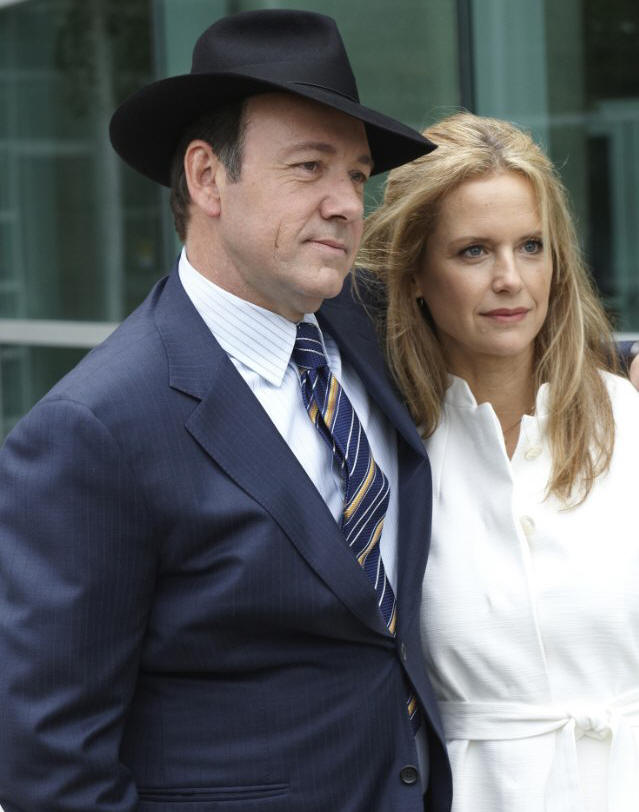 How closely did you follow the
Abramoff story before getting this role?
How closely did you follow the
Abramoff story before getting this role?
Not a lot. I was already living
in London when it broke. I peripherally remember it, because I’ve
always had a fascination for politics and have been involved in
politics for some time. But I didn’t have, I’m sure, what it must
have been in the US, because we have this quaint thing we call the
24-hour news cycle – which usually lasts for a week. So, I kind of
remembered it, but not really…. After I met George and after we
decided we wanted to make the film together, I found out that I
might get the opportunity to meet [Abramoff]. I said, well, I’ll hold off
on reading anything or going back and doing lots of research,
because I didn’t want to meet him with lots of other people’s
commentary in my head. Then I started the process of research after
I met him.
What kind of research did you
do into Orthodox Judaism?
As much as I could. I met with a
couple of rabbis. Someone taught me how to do all the
davening. I
think I’m saying that right. I had to learn some of the Hebrew,
because George wanted me to actually be saying it, but I think I’m
relatively grateful that no one can really hear what I’m saying,
because I’m sure I didn’t get it all right. That aspect of his
character was so fascinating to me, because on the one hand he’s an
extraordinarily devoted, religious man who believed in his faith.
He consistently did it every single day. That was part of his
routine and part of his life. Yet, he makes a bunch of misjudgments
and crosses the line. And yet, maybe in his own head, the good
things he was doing – and in his mind he was doing lots of good
things, including giving lots and lots of money away to lots and
lots of people who didn’t have it and needed it – justified the
other things he was doing. It’s always interesting to find that,
what you look at as a contradiction in someone’s behavior.
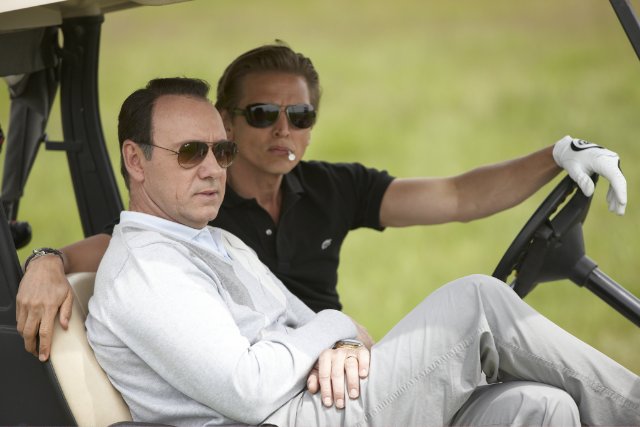 When you met Jack, what
questions did you ask him?
When you met Jack, what
questions did you ask him?
I was mostly interested in the
emotional terrain, because all the facts about the case...
and look, he
may have had his own agenda and may have been saying things a
certain way – I knew I’d be able to vet lots of other people and
figure out if he was being upfront with me or not. At the end of
the day, I was just trying to figure out what was he going through
and at what point – or was there any point – when he started to lose
the forest for the trees. What you get a sense of and I think what
we’re trying to illustrate in the film is
that he was living in a culture and an environment in which lots of
this shit is going down. Lots of people were selling access, and
they still are. So then you sort of go: well – wow. But
after meeting him and then meeting other people on his team – people
that knew him, people that hated him, people that wanted him dead –
I got a lot of different opinions on him. Then I started reading
everything. All you have to do is Google his name, and it’s like:
Fuck! I’m going to be here for weeks! And wow, was he made out to
be the greediest devil incarnate that ever walked the face of the
Earth. I thought, well that’s convenient for an industry that wants
to pat itself on the back and say, “See we threw this bad man in
jail and we’ve cleaned up our industry.” I think we just went
through an election where more money was spent than at any other
time in our country’s history. So that’s to me what was interesting
about being able to play this guy. He’s symbolic of an environment
and culture that’s still happening today.
Between this and
Recount, you’ve done a couple of movies now about politics, very
recent politics…
It is
funny shit, isn’t it?
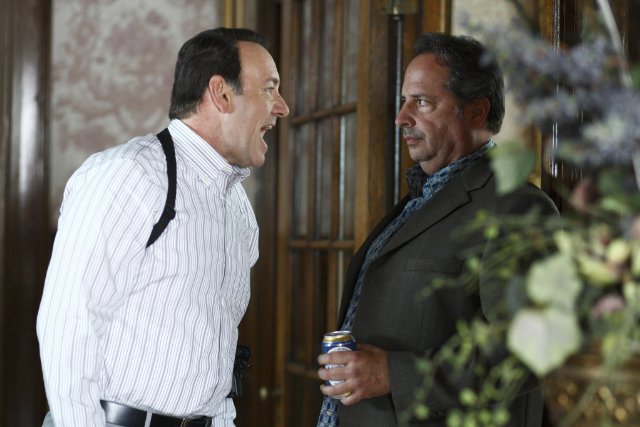 Do you consider yourself to be a political
person?
Do you consider yourself to be a political
person?
Yeah,
I’ve always been a political person. I admire politics. I think
public service is one of the most extraordinary things that people
can do. What I don’t admire is power and money and influence
invading our political system and destroying the kind of respect
that people should have for public service. As long as we force
everybody who ever runs for office that what they really have to be
spending their time doing is raising millions and millions and
millions and millions and millions of dollars for TV ads – then we
get what we ask for and it will always be corrupt. Want to clean up
the corruption? Take the money out. But the TV networks won’t run
ads for free. I got in trouble for suggesting that once.
Where do you think apathy towards politics
comes from?
Because I think some people don’t think that their vote counts for
anything. Some people think they vote people in. We do live in the
now. It’s very curious to me how impatient people are. I remember,
what ten years ago? It actually took you about five minutes to get
on an internet page. We were like, “This is fucking amazing!” Now,
three seconds go by and your page doesn’t come up, and you’re like,
“What the fuck is wrong with this piece of shit?” I think that
attitude has permeated our society. You look at politics – and we
tend to do this, I don’t think we just do this in just this
country, this tends to happen all over the world – we find someone
who we believe is going to solve all of our problems, who is going
to be a savior, and they’re going to have a magic wand. Then they
come in, and they can be very effective. They can actually
accomplish a great deal. But because we’re not out of the shithole
yet, then we point fingers and say, “Oh, this person wasn’t who we
thought they were.” We want people to solve our problems. A lot of
people have responsibility for the problems that we’re facing right
now. So I think there’s an impatience and fantasy that it’s all
going to happen overnight. These things take a long time.
 Is Jack out of prison now?
Is Jack out of prison now?
He is
now. He’s totally free.
Has he reflected on the movie now that it has
come out?
I
don’t know if he’s seen it. If he has seen it, I haven’t heard.
His kids have seen it. I saw his two children in Los Angeles at
the AFI [American Film Institute] screening. Parts of the movie
might be painful for them to watch, but I think that they were very
pleased we didn’t set out to play him as the caricature he had
become – as a certain one-dimensional villainous person, but as a
real human being. I think they are happy about that, but I don’t
know what he thinks.
Sadly, George passed away before the movie was
released. What was he like to work with?
George is like a kid. He was like a big kid whose playground was
the storytelling. We laughed a lot. We discussed a lot. I mean,
every day on the film was just an incredibly fun and intense
conversation about how can we achieve the tone that we want to
achieve. How can we make this entertaining? George had this
certain mantra from the very first day, which was “I don’t want to
make a boring film about Washington. I want to make fucking
Goodfellas in DC.” He knew exactly what he wanted and it was a
complete pleasure to work with him. I’m sorry and sad he’s not here
to enjoy the release of the film. It was just the most unexpected
and surprising circumstance. It’s made it very odd to be out trying
to promote the movie. But I know that in the end, George would
really want people to see it. If people saw it, it would make him
very happy.
What elements turn a political comedy into a
classic?
Well,
I think if you’re not afraid of the humor, if you’re not afraid of
embracing the fact that some of the decisions that people make in
either this film or Recount – which was, again, a very
entertaining and funny movie, more than you would have thought – you
kind of embrace th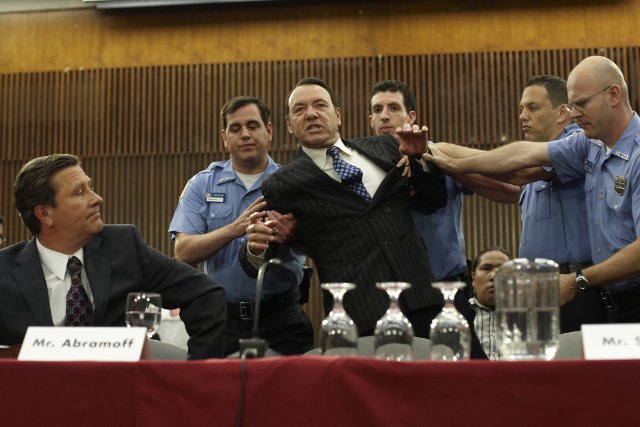 e craziness and the outrageous decisions, the
over-the-topness of it all, it’s funny. It really is inherently
funny. George and I weren’t afraid of trying to make… if we’re
going to make some political points, how much more fun is it to be
able to do a scene
like the Senate hearing scene. If we’re going to
show the hypocrisy at work, let’s do it in a way that’s
entertaining, rather than Jack Abramoff is going to give a big,
boring speech and lecture about hypocrisy. It’s much more fun to
approach it [this way]. In fact, Abramoff to whatever degree he had
said to us that had he known he was going to jail, he would have
never taken the fifth. That’s why that scene ended up being written
that way. George and I were like, “What would that scene be like if
he had actually not taken the fifth?” (chuckles) It grew
from there into a kind of fantasy scene. So we weren’t afraid of
what was funny. We just have to embrace it.
e craziness and the outrageous decisions, the
over-the-topness of it all, it’s funny. It really is inherently
funny. George and I weren’t afraid of trying to make… if we’re
going to make some political points, how much more fun is it to be
able to do a scene
like the Senate hearing scene. If we’re going to
show the hypocrisy at work, let’s do it in a way that’s
entertaining, rather than Jack Abramoff is going to give a big,
boring speech and lecture about hypocrisy. It’s much more fun to
approach it [this way]. In fact, Abramoff to whatever degree he had
said to us that had he known he was going to jail, he would have
never taken the fifth. That’s why that scene ended up being written
that way. George and I were like, “What would that scene be like if
he had actually not taken the fifth?” (chuckles) It grew
from there into a kind of fantasy scene. So we weren’t afraid of
what was funny. We just have to embrace it.
You spoke men of power. Do you have any
interest in revisiting Lex Luthor in the Superman reboot?
Listen, they haven’t called. All I hear is what you’ve probably
heard, too. All I know is that when I hear a reboot, I’m assuming
that means they’re going to recast everybody.
There’s some uncertainty of whether they were.
Would you play him again?
Yeah.
In principal, there was already supposed to be a second one, but it
never happened, so it’s their option. I had a blast doing it, but
my suspicion is that they’re going to reboot the whole thing. I’d
be very surprised if they came and said, “Hey, would you do it
again?” Which is actually a shame, I really thought [it would be
huge]. I’m a huge fan of [Superman Returns writer/director]
Bryan Singer’s and I thought the movie did pretty damn well.
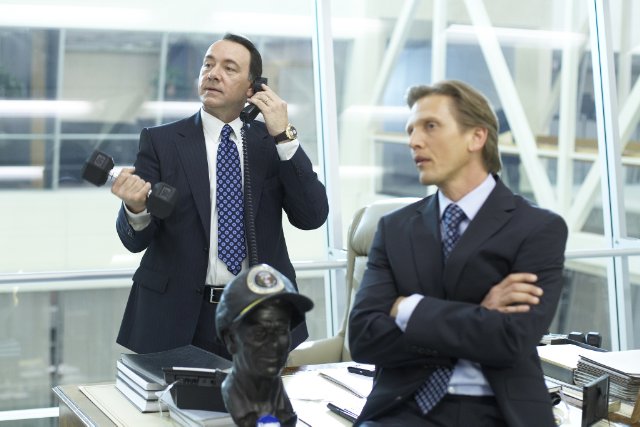 There were a lot of risks, like Superman having
a kid. People weren’t expecting it.
There were a lot of risks, like Superman having
a kid. People weren’t expecting it.
It’s
always one of those things where because it’s such an important
franchise to so many people, they are so devoted to it, that you’re
always going to end up with people who didn’t like it or did like
it. Or liked that part but didn’t like that part. I had a blast.
Did you ever talk with Bryan about any ideas if
you were to come back?
No,
because it never got to that point. He was so focused on getting
that film done. Over the years, I’ve kept hearing little rumors
here and there. This is happening…. Then I read in the paper that
it was all being rebooted and new people were on board. I don’t
even know if they have a director.
Yes, Zack Snyder
[300,
Watchmen].
Oh,
okay.
George said in the press kit that you always do
such a good job playing very likable antiheroes.
Why does that type of role appeal to you?
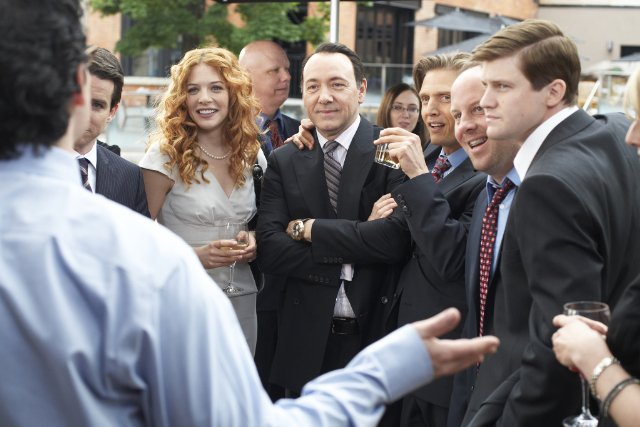 It’s
not that that type of role appeals to me. I know sometimes that
there’s this impression that people in this business who have gotten
to a certain point or have done well, successfully, that we sit
around and pick our films – like there’s a plethora of every movie
that’s ever going to open in the next year. I can go; I’m going to
do that one. George Clooney can do that one and I’ll do that one.
You can only do what you’re offered, number one. In my case, I can
only do not just what I’m offered, but what I’m available to do,
given my full responsibilities of running the Old Vic Theater in
London which is what I’ve been doing the past eight years. It’s
interesting to try and draw a line. The truth is that I try to find
the most interesting things that I think are worth doing at the time
that I’m available to do them. And then other things are never
offered, and I go, “Why didn’t I get that?”
It’s
not that that type of role appeals to me. I know sometimes that
there’s this impression that people in this business who have gotten
to a certain point or have done well, successfully, that we sit
around and pick our films – like there’s a plethora of every movie
that’s ever going to open in the next year. I can go; I’m going to
do that one. George Clooney can do that one and I’ll do that one.
You can only do what you’re offered, number one. In my case, I can
only do not just what I’m offered, but what I’m available to do,
given my full responsibilities of running the Old Vic Theater in
London which is what I’ve been doing the past eight years. It’s
interesting to try and draw a line. The truth is that I try to find
the most interesting things that I think are worth doing at the time
that I’m available to do them. And then other things are never
offered, and I go, “Why didn’t I get that?”
Are you going to direct again?
I’d love to direct again. It’s just it’s a big
commitment, and knowing that I’m starting Richard III in May
and that will take me ten months. It will be a ten month
commitment. We’re doing it at the Old Vic and we’re touring the
world, nine cities in three continents. Then we come to Brooklyn.
That’s going to be May [2011] to March [2012]. So not [going to be
directing] any time soon.